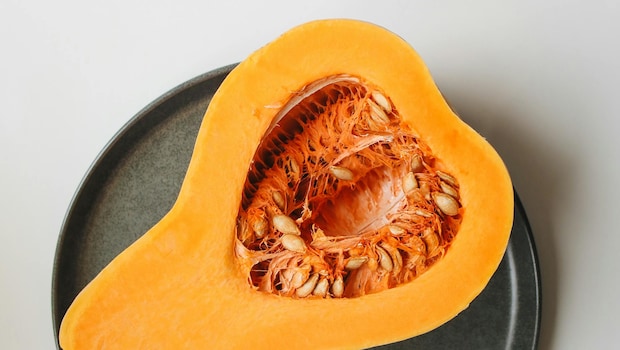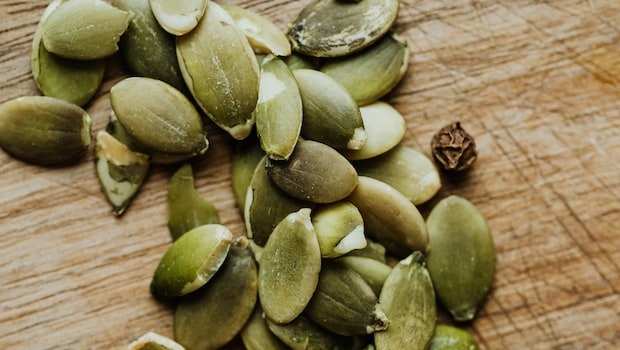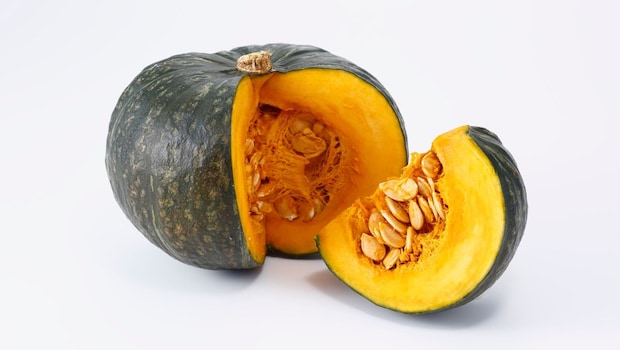Have you been tossing pumpkin from your plate thinking it is boring? Did you think it is nothing more than a Halloween decoration item? Think again. It is actually a nutritional powerhouse that deserves a spot in your diet, especially during autumn when the season undergoes a transition. From boosting immunity to aiding digestion, this vibrant winter squash is packed with vitamins, minerals, and antioxidants that can do wonders for your health. And the best part? It is affordable, versatile, and adds a pop of colour and natural sweetness to your meal. Whether you roast it, mash it, stir it into soups, or sneak it into sabzis, pumpkin is the seasonal superfood your body will thank you for. Let us explore further.
Pumpkin Nutrition At A Glance (Per 100g):
Nutrient-dense, low in calories, and full of antioxidants, pumpkin is a seasonal superfood that can easily be incorporated into everyday meals.
- Calories: 26 kcal
- Water: 94 percent
- Vitamin A: 170 percent daily value (DV)
- Vitamin C: 15 percent DV
- Potassium: 7 percent DV
Also Read: This Pumpkin Juice Is How Soha Ali Khan Starts Her Day, You Should Try It Too

Here Are 6 Reasons Why You Should Add Pumpkin To Your Autumn Diet:
1. Boosts Your Immunity Naturally:
Autumn brings festive cheer, but also seasonal sniffles. Pumpkin is rich in beta-carotene, which converts into vitamin A, a key nutrient for immune function. It also contains vitamin C, iron, and folate, which help your body fight infections and recover faster.
A 2025 review in Indian Farmer journal confirms pumpkin's role in boosting immunity, thanks to its antioxidant-rich profile including carotenoids, tocopherols, and polyphenols. Its fibre content also nourishes the gut, which further supports immune health.
Quick tip: Try blending pumpkin puree with ginger and turmeric for a warming autumn smoothie that tastes as good as it is for you.
2. Smooth Digestion And Healthy Gut:
Pumpkin is packed with soluble and insoluble fibre, which helps regulate digestion and supports a healthy gut microbiome. It is also a natural prebiotic, feeding the good bacteria in your intestines. Ayurveda considers pumpkin a demulcent, a food that soothes and coats the digestive tract. It is especially helpful for those dealing with acidity, bloating, or reflux.
Quick tip: A light pumpkin soup with dill seeds is ideal for a comforting meal, or if time is short, you can order a bowl of seasonal pumpkin soup through your favourite food delivery app.
3. Great For Skin:
Want glowing skin without splurging on serums? Pumpkin has you covered. It is rich in beta-carotene, vitamin C, and vitamin E, which help fight oxidative stress and promote collagen production. According to health experts, pumpkin's high beta-carotene content makes it a natural skin saviour, reducing acne and slowing signs of ageing.
4. Keeps You Full Without The Calories:
Pumpkin is 94 per cent water, low in calories (just 26 kcal per 100g), and high in fibre, making it a smart swap for starchy carbs like rice or potato. It keeps you full for longer and curbs untimely cravings, "making a perfect ingredient for weight management," states Delhi-based nutritionist Anita Kumar.
5. Heart-Friendly:
Pumpkin is rich in potassium, which helps regulate blood pressure, and fibre, which supports healthy cholesterol levels. Its antioxidants help reduce inflammation and protect blood vessels. The Indian Farmer review highlights pumpkin's cardioprotective benefits, particularly from seeds and oils that contain phytosterols and unsaturated fatty acids.
6. Promotes Clear, Healthy Eyes:
With most of us glued to screens, eye health is more important than ever. Pumpkin is a rich source of vitamin A, lutein, and zeaxanthin, which protect the retina and reduce the risk of cataracts and macular degeneration. Did you know: One cup of pumpkin puree provides over 200 per cent of your daily vitamin A needs.
Quick tip: For a breakfast boost, stir pumpkin puree into your oats with chia seeds for a vision-friendly start to the day.
Bonus: Pumpkin Seeds Are Nutritional Bomb
Do not toss those seeds. Pumpkin seeds are rich in magnesium, zinc, protein, and healthy fats, supporting heart health, brain function, and sleep quality thanks to their tryptophan content. Ayurveda considers pumpkin seeds a rasayana, a rejuvenating food that strengthens immunity and promotes vitality.
Kitchen Hack: Roast pumpkin seeds with turmeric and pink salt for a crunchy, dosha-balancing snack. You can also add sundried pumpkin seeds to morning smoothies or rotis to add crunch and nutrition.
Also Read: 5 Amazing Reasons To Drink Pumpkin Seed Water On An Empty Stomach

Photo Credit: iStock
Pumpkin In Indian Kitchen: 5 Delicious Ways To Add It To Your Diet
1. Kumror Chokka - Bengal And Bihar's Festive Favourite
Soft pumpkin cubes with boiled kala chana, tempered with panch phoron, green chillies, and mustard oil. Served with luchi, it balances sweetness and earthy spices beautifully.
2. Kaddu Ki Sabzi - North India's Sweet-Sour Comfort
A staple in Uttar Pradesh, Delhi, and Rajasthan households, this pumpkin sabzi is cooked with jaggery, dry mango powder (amchur), and fenugreek seeds. Often paired with kachori during vrat days.
3. Olan - Kerala's Coconut-Laced Classic
Part of the traditional Sadya feast, olan is a gentle curry with pumpkin, cowpeas, and coconut milk. Mildly spiced, it lets pumpkin's natural sweetness shine. Served with red matta rice, it is a must-try.
4. Mathanga Pulinkari - Kerala's Tangy Tamarind Curry
A bold, tangy curry with pumpkin, tamarind, coconut, and spices including red chillies and coriander. Thicker than olan, it pairs beautifully with steamed rice or dosa.
5. Kaddu Nu Shaak - Gujarat's Tangy Treat
A flavour bomb made with tamarind pulp, jaggery, mustard seeds, and sesame seeds. Served with rotli or thepla, it is comforting for weekdays and festive enough for special occasions.
Note: If cooking is not convenient, many restaurants now offer these dishes, and you might find them on your favourite food delivery app.
How To Buy, Store And Use Pumpkin?
1. Choosing The Right Pumpkin: Look for deep orange skin that is firm, heavy for its size, and free from soft spots, cracks, or mould.
2. Storing Pumpkin:
- Whole pumpkins last 2-3 weeks in a cool, dry place away from sunlight.
- Once cut, wrap pieces in a clean cloth or airtight container and refrigerate for 3-4 days.
- Freeze pumpkin puree in ice cube trays or small containers for up to 3 months for quick soups, smoothies, or baking.
3. Fresh Vs Canned:
- Fresh pumpkin is ideal for Indian recipes, especially when roasted or slow-cooked.
- Unsweetened canned pumpkin is convenient, shelf-stable, and perfect for smoothies, desserts, or recipes needing smooth texture.

Photo Credit: iStock
Who Should Be Careful With Pumpkin?
Pumpkin is generally safe for most people, but:
1. People With Kidney Issues: High potassium content may be risky for those with chronic kidney disease.
2. Diabetics Should Watch Portions: Moderate glycaemic index means large quantities could raise blood sugar.
3. Rare Allergies: Some may experience itching, swelling, or digestive discomfort.
4. Overconsumption Can Lead To Nutrient Imbalance: Excess beta-carotene may cause harmless yellowing of the skin (carotenemia).
Pumpkin is far more than a festive filler. It is a functional food that supports immunity, digestion, skin, heart, and eye health. Got a favourite pumpkin recipe? Share it in the comments below or tag us on social media to showcase your autumn creations.
Disclosure: This article may contain links to third-party websites or resources. However, this does not affect the integrity of the content, and all recommendations and views are based on our independent research and judgment.
About Somdatta SahaExplorer- this is what Somdatta likes to call herself. Be it in terms of food, people or places, all she craves for is to know the unknown. A simple aglio olio pasta or daal-chawal and a good movie can make her day.









